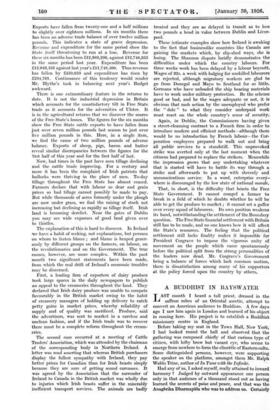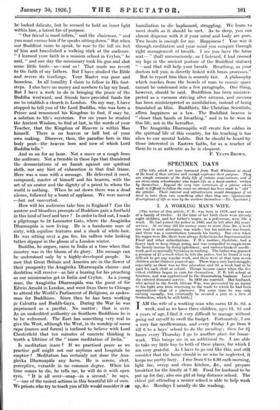A BUDDHIST IN BAYSWATER
TAST month I heard a tall priest, dressed in the 4 saffron robes of an Oriental ascetic, attempt to convert an American audience to Buddism. A few days ago I saw him again in London and learned of his object in coming here. His project is to establish a Buddhist missionary centre in England.
Before taking my seat in the Town Hall, New York; -I had looked round the hall and observed that the gathering was composed chiefly of that curious type of citizen, with lofty brow but vacant eye, who seems to emerge from nowhere to form the clientele of Eastern cults. Some distinguished persons, however, were supporting the speaker on the platform, amongst them Mr. Ralph Waldo Trine, author of In Tune with the Infinite.
Had any of us, I asked myself, really attained to inward harmony ? Judged by outward appearance one person only in that audience of a thousand stood out as having learned the secrets of poise and peace, and that was the Anagarika Dharmapida who was to address us. Certainly he looked delicate, but he seemed to hold an inner light within him, a latent fire of purpose.
"Our friend is most infirm," said the chairman, "and you must excuse him if he speaks sitting down." But when our Buddhist canrie to speak, he rose to the full six feet of him and brandished a walking stick• at the audience. "I learned your faith in a mission school in Ceylon," he said, "and one day the missionary took his gun and shot some little birds—so—and so ! That made me revert to the faith of my fathers. But I have studied the Bible and revere its teachings. Your Master was poor and homeless. In all humility I claim to follow in His foot- steps. I also have no money and nowhere to lay my head. But I have 'a work to do in bringing the peace of the Buddha westward, and friends have provided funds for me to establish a church in London. On my way, I have stopped to tell you of the Lord Buddha, who was born a Prince and renounced his Kingdom to find, if may be, a solution to life's mysteries. For six years he studied the Ancient Wisdom, to find at last, in the words of your Teacher, that the Kingdom of Heaven is within Man himself. There is no heaven or hell but of your own making. Discover, then, the paradise here in this body pent—the heaven here and now of which Lord Buddha tells."- And so on for an hour. Not a move or a cough from the audience. Not a tremble in those lips that thundered the denunciations of an Isaiah against our spiritual sloth, nor any hint of exhaustion in that frail frame. Here was a man with a message. He delivered it erect, composed, master of himself and his hearers, with the art of an orator and the dignity of a priest to whom the world is nothing. When he sat down there was a dead silence, followed by a burst of applause. We were moved —but not converted.
How will his audiences take him in England ? Can the austere and bloodless precepts of Buddism gain a foothold in this land of beef and beer ? In order to find out, I made a pilgrimage to 52 Lancaster Gate, where the Anagarika Dharmapala is now living. He is a handsome man of sixty, with aquiline features and a shock of white hair. He was sitting over a gas fire, his saffron robe looking rather depayse in the gloom of a London winter.
Buddha, he argues, came to India at a time when that country was in the bloom of its glory. His message can be understood only by a highly-developed people. So now that Great Britain and America are in the flower of their prosperity the Anag'arika Dharmapala claims—and doubtless will receive—as fair a hearing for his preaching as our missionaries get in India and Ceylon. As a young man, the Anagarika Dharmapala was the guest of Sir Edwin Arnold in London, and went from there to Chicago to attend the World's Parliament of Religions, as spokes- man for Buddhism. Since then he has been working in Calcutta and Buddh-Gaya. During the War he was imprisoned as a pacifist. No matter ; that is over. As an undoubted authority on Southern Buddhism he is to be welcomed. The East has something very real to give the West, although the West, in its worship of names rupa (names and forms) is inclined to believe with Lord Chesterfield that ten minutes of concrete thinking is worth a lifetime of the "inane meditation of India."
Is meditation inane ? If we practised peace as we practise golf might not our asylums and hospitals be emptier ? Meditation has certainly not done the Ana- garika Dharrnapala any harm. He is serene, alert, perceptive, versatile in no common degree. When his time comes to die, he tells me, he will do it with open eyes. "It is all over-,--snap—in a second," he says, "—one of the easiest actions in this beautiful life of ours. We priests who try to teach you -.Ali& would consider it aak humiliation to die haphazard, struggling. We learn to meet death as it should be met. As to sleep, you can almost dispense with it if your mind and body are pure. Two hours is enough for me. Happiness ? You win it through meditation and your mind you conquer through right management of breath. I see you have the lotus seat—" (half unconsciously, as I listened, I had crossed my legs in the ancient posture of the Buddhist statues) "—and that will help your breath. Breathing, as your doctors tell you, is directly linked with brain processes."
But to report him thus is scarcely fair. A philosophy which reaches from the bowels of man to cosmic space cannot be condensed into a few paragraphs. One thing, however, should be said. Buddhism has been misinter- preted as a vacuous striving after nirvana, and nirvana has been misinterpreted as annihilation, instead of being translated as bliss. Buddhists, like Christian Scientists, affirm happiness as a law. The Buddhist heaven is "closer than hands or breathing," and is to be won in this life, not in the hereafter.
The Anagarika Dharmapala will create few eddies in the spiritual life of this country, for his teaching is too alien to our mental habits. But he should be heard by those interested in Eastern faiths, for as a teacher of them he is as authentic as he is eloquent.
F. YEATS-BROWN.



















































 Previous page
Previous page